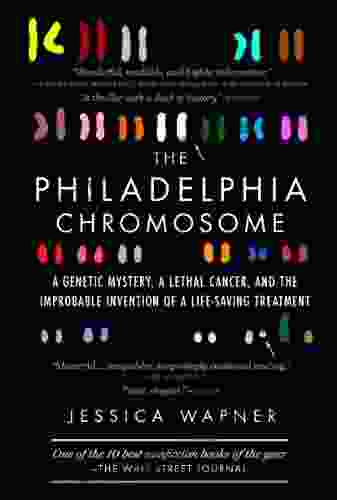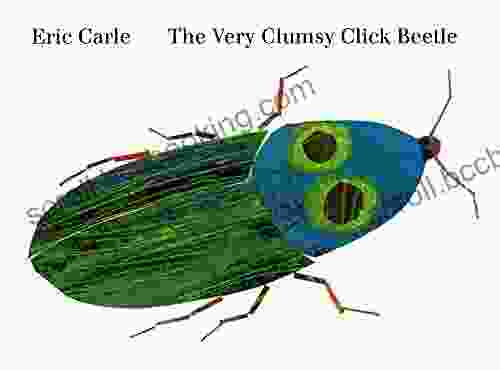Genetic Mystery Lethal Cancer And The Improbable Invention Of Lifesaving

Cancer, a deadly disease that has plagued humanity for centuries, has always been shrouded in mystery. In the past, little was known about the causes and mechanisms behind this disease, making it difficult to find effective treatments. However, thanks to the remarkable advancements in genetics over the past few decades, we have made significant progress in understanding cancer and developing new therapies to fight it.
In this article, we will delve into the genetic mystery behind lethal cancer and explore the improbable invention of lifesaving treatments that have revolutionized the fight against this deadly disease. We will learn about the pioneering scientists and researchers who dedicated their lives to unraveling the secrets of cancer and the incredible breakthroughs that have led to new hope for patients.
4.6 out of 5
| Language | : | English |
| File size | : | 3293 KB |
| Text-to-Speech | : | Enabled |
| Screen Reader | : | Supported |
| Enhanced typesetting | : | Enabled |
| Word Wise | : | Enabled |
| Print length | : | 345 pages |
| Lending | : | Enabled |
The Genetic Basis of Cancer
Cancer is a complex disease that arises due to genetic mutations in cells. These mutations can be inherited or acquired during a person's lifetime. Inherited mutations are passed down from parents to children through genes, while acquired mutations can occur spontaneously or be caused by environmental factors such as exposure to carcinogens.
Genetic mutations can affect genes involved in various cellular processes, including cell growth, division, and repair. When these genes are mutated, they can lead to the uncontrolled growth of cells, which is the hallmark of cancer.
The Challenge of Lethal Cancer
Some cancers, particularly those that are diagnosed at advanced stages, can be extremely difficult to treat. These cancers often develop resistance to conventional therapies such as chemotherapy and radiation, making them virtually incurable.
One of the biggest challenges with lethal cancer is the ability of cancer cells to evade the body's immune system. The immune system is designed to recognize and destroy abnormal cells, including cancer cells. However, cancer cells can develop mechanisms to hide from the immune system, making them invisible to the body's defenses.
The Improbable Invention of Lifesaving Treatments
Despite the challenges posed by lethal cancer, the past few decades have witnessed the development of new and innovative treatments that have significantly improved the outlook for patients. These treatments are based on the latest advancements in genetics and have revolutionized the way we approach cancer therapy.
One of the most promising breakthroughs in cancer treatment is immunotherapy. Immunotherapy drugs work by boosting the body's own immune system to recognize and kill cancer cells. This approach has shown great promise in treating a wide range of cancers, including those that were previously considered incurable.
Another important development in cancer treatment is the advent of targeted therapies. Targeted therapies are drugs that specifically target genetic mutations that are found in cancer cells. These drugs can block the growth and proliferation of cancer cells without harming healthy cells, making them more effective and less toxic than traditional chemotherapy drugs.
The Pioneers of Cancer Research
The development of lifesaving cancer treatments would not have been possible without the dedication and ingenuity of pioneering scientists and researchers. These individuals dedicated their lives to unraveling the mysteries of cancer and developing new treatments to fight this deadly disease.
One of the most influential figures in cancer research is Dr. James Allison, who was awarded the Nobel Prize in Physiology or Medicine in 2018 for his work on immunotherapy. Dr. Allison's research led to the development of drugs that block the PD-1 protein, which is found on the surface of T cells and can prevent them from attacking cancer cells.
Another notable pioneer in cancer research is Dr. Brian Druker, who was instrumental in the development of imatinib, a targeted therapy drug used to treat chronic myeloid leukemia. Dr. Druker's research led to a dramatic improvement in the survival rates of patients with this type of leukemia, which was previously considered incurable.
The Future of Cancer Treatment
The field of cancer research is constantly evolving, with new discoveries and advancements being made all the time. As we continue to learn more about the genetic basis of cancer, we will be able to develop more effective and personalized treatments for patients.
One of the most promising areas of research is the development of CAR T-cell therapy. CAR T-cell therapy involves genetically modifying a patient's own T cells to recognize and attack cancer cells. This approach has shown great promise in treating certain types of cancer, and it is currently being investigated in clinical trials for a wider range of cancers.
Another exciting area of research is the development of gene editing therapies. Gene editing technologies such as CRISPR-Cas9 can be used to correct genetic mutations that are responsible for cancer. This approach has the potential to cure cancer at the genetic level, providing new hope for patients with even the most advanced stages of disease.
The genetic mystery behind lethal cancer has been gradually unraveled thanks to the remarkable advancements in genetics over the past few decades. This has led to the development of new and innovative treatments that have revolutionized the way we approach cancer therapy, providing new hope for patients even with the most advanced stages of disease.
As the field of cancer research continues to evolve, we can expect to see even greater breakthroughs in the years to come. With the continued dedication and ingenuity of scientists and researchers, we are moving closer to a future where cancer is no longer a death sentence but a manageable disease.
4.6 out of 5
| Language | : | English |
| File size | : | 3293 KB |
| Text-to-Speech | : | Enabled |
| Screen Reader | : | Supported |
| Enhanced typesetting | : | Enabled |
| Word Wise | : | Enabled |
| Print length | : | 345 pages |
| Lending | : | Enabled |
Do you want to contribute by writing guest posts on this blog?
Please contact us and send us a resume of previous articles that you have written.
 Book
Book Novel
Novel Page
Page Chapter
Chapter Text
Text Story
Story Genre
Genre Reader
Reader Library
Library Paperback
Paperback E-book
E-book Magazine
Magazine Newspaper
Newspaper Paragraph
Paragraph Sentence
Sentence Bookmark
Bookmark Shelf
Shelf Glossary
Glossary Bibliography
Bibliography Foreword
Foreword Preface
Preface Synopsis
Synopsis Annotation
Annotation Footnote
Footnote Manuscript
Manuscript Scroll
Scroll Codex
Codex Tome
Tome Bestseller
Bestseller Classics
Classics Library card
Library card Narrative
Narrative Biography
Biography Autobiography
Autobiography Memoir
Memoir Reference
Reference Encyclopedia
Encyclopedia Eric Goldberg
Eric Goldberg Zhuqing Li
Zhuqing Li Eric Flanagan
Eric Flanagan Jd Chandler
Jd Chandler Marie Schaeller
Marie Schaeller Eric Lindner
Eric Lindner Erica L Ball
Erica L Ball Erica Armstrong Dunbar
Erica Armstrong Dunbar William Glover
William Glover Henry Stedman
Henry Stedman Gallup Press
Gallup Press Jackie Newgent
Jackie Newgent Giles Johnston
Giles Johnston Manfred Basedow
Manfred Basedow Robert J Bernstein
Robert J Bernstein Sally Denton
Sally Denton Joshua Lyon
Joshua Lyon Thomas Merton
Thomas Merton Mike Nawrocki
Mike Nawrocki Eric Gibson
Eric Gibson
Light bulbAdvertise smarter! Our strategic ad space ensures maximum exposure. Reserve your spot today!
 Harold PowellFollow ·16.5k
Harold PowellFollow ·16.5k Dominic SimmonsFollow ·10k
Dominic SimmonsFollow ·10k Shane BlairFollow ·5k
Shane BlairFollow ·5k Jacques BellFollow ·18.3k
Jacques BellFollow ·18.3k Edmund HayesFollow ·3.6k
Edmund HayesFollow ·3.6k Eli BrooksFollow ·12k
Eli BrooksFollow ·12k Steven HayesFollow ·17k
Steven HayesFollow ·17k Dave SimmonsFollow ·11.9k
Dave SimmonsFollow ·11.9k

 Roland Hayes
Roland HayesMagda: A Mother's Love, A Daughter's Redemption - A...
Immerse Yourself in the Captivating True Story...

 Spencer Powell
Spencer PowellSnow White Retold: A Tale of Love, Magic, and...
Once upon a time, in...

 Jake Powell
Jake PowellMaster the SATs with Effective Strategies from 99th...
The SATs are a challenging exam,...

 Brian Bell
Brian BellSEO for Dummies: Unlock the Secrets to Search Engine...
In today's digital...

 Jaylen Mitchell
Jaylen MitchellBechtel: Unveiling the Unsung Heroes Who Built the World
In the annals of global infrastructure, the...
4.6 out of 5
| Language | : | English |
| File size | : | 3293 KB |
| Text-to-Speech | : | Enabled |
| Screen Reader | : | Supported |
| Enhanced typesetting | : | Enabled |
| Word Wise | : | Enabled |
| Print length | : | 345 pages |
| Lending | : | Enabled |














